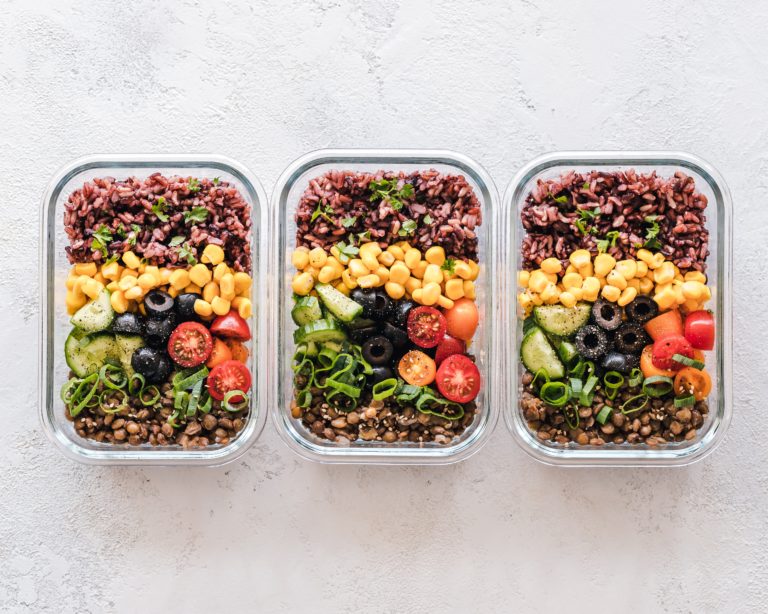The preparation of food in the kitchen (meal prep) is 95% of the time-correlated to the success rate of your weight loss plan.
In fact, without careful planning and selection of meals, a diet plan can be completely ruined.
What is Meal Prepping
Meal prep is an acronym for meal preparation.
As the name implies, it is the careful selection and preparation of the right foods for a diet plan.
Classes of food, calories, and size of the human in question are all taken into consideration to give the perfect nutrition to the individual undergoing the weight loss.
How to Meal Prep?
The first thing to put in consideration when meal prepping is to consider the following:
- Your height
- Your weight
- Amount of activity you do on a given day.
Classes of food
There are six classes of food:
- Carbohydrates
- Fats
- Vitamins
- Minerals
- Proteins
- Water
1. Carbohydrates
Carbohydrates are energy giving foods, and are essentially sugars, starches, and sometimes fibers, found readily, in so many fruits, grains, and sometimes proteins, like milk.
Simple carbohydrates examples include glucose, fructose, galactose, sucrose, lactose, and maltose, found readily in blood, fruits, milk, fruits, milk, malt, respectively.
Complex carbohydrates like starches, are mainly found in the cereal plants.
Some common plants that contains high amounts of carbohydrates are, sugarcane, wheat, corn, cassava, etc.
2. Fats
Like carbohydrates, fats are also energy giving foods, they consists of esters, or fatty acids, which are as abundant as carbohydrates.
3. Vitamins
Vitamins are essential compounds needed in small quantities, for essential functioning of the human body.
- Vitamin A: Whose deficiency can cause, Night blindness, hyperkeratosis, and keratomalacia.
- Vitamin B1: Whose deficiency can cause, Beriberi, Wernicke-Korsakoff syndrome.
- Vitamin B2: Whose deficiency can cause, Ariboflavinosis, glossitis, angular stomatitis
- Vitamin B3: Whose deficiency can cause, Pellagra
- Vitamin B5: Whose deficiency can cause, Paresthesia
- Vitamin B6: Whose deficiency can cause, Anemia, Peripheral neuropathy
- Vitamin B7: Whose deficiency can cause, Dermatitis, enteritis
- Vitamin B9: Whose deficiency can cause, Megaloblastic anemia and deficiency during pregnancy is associated with birth defects, such as neural tube defects
- Vitamin B12: Whose deficiency can cause, Vitamin B12 deficiency anemia
- Vitamin C: Whose deficiency can cause, Scurvy
- Vitamin D: Whose deficiency can cause, Rickets and osteomalacia
- Vitamin E: Whose deficiency is very rare; mild hemolytic anemia in newborn infants
- Vitamin K: Whose deficiency can cause, Bleeding diathesis
4. Minerals
Minerals, like vitamins are inorganic substances, that is needed by the body to function optimally and properly.
They include major minerals, like calcium, phosphorus, magnesium, sodium, potassium, chloride and sulfur, and trace minerals (which little is required), like iron, manganese, copper, iodine, zinc, cobalt, fluoride and selenium.
5. Proteins
Proteins are bodybuilding foods. They are complex, naturally occurring organic substances found in both plants and animals, but majorly in the later.
Examples of protein sources, are meat, legumes etc.
6. Water
Water is abundant in nature, and can be found everywhere, including your body. In fact, you body is made up of 70% of water.
As such, it is recommended to consider water, during your meal prepping endeavors, because without water, you will die.
Meal Prepping Technique
You need to prep your meals in such a way that it has lots of proteins, followed by vitamins and minerals, the least of the bunch should be carbohydrates.
Depeding on the motive, your meal plan should also be flexible.
For example, if you are planning, to bulk up, adding or incorporating, more carbohydrate during meal prepping, isn’t a bad idea.
Whereas, if you are trying to shred, you can cut back and reduce your intake of carbohydrates.
Storing Prepped meals?
Prepped meals are stored in containers. Then frozen in the freezer or cooled in the fridged.
After preparation, it is necessary to microwave the prepped meals to kill microorganisms before storing them in the fridge.
Benefits of Meal Prepping
- Saves you money
- Saves your time
- Allows you to stay focused on your weight loss goals
- Improves your orderliness.
FAQ
Below are some frequently asked questions asked about meal prepping.
Meal Prepping is good because it keeps you motivated throughout the weight loss program.
In fact, meal prepping is an indication of whether you can see through your weight loss program.
Anybody can a weight loss program, but few people can see through a weight loss program.
Of course, meal prepping helps you eat healthier, and avoid eating junk food.
As such, it is healthy for those who practice them.
Besides, meal prepping helps you stay organized in your day to day activities.
It depends on how the meal was packaged. If packaged well, prep meals should last a week, if frozen or three days, when stored in the fridge.
The most important thing is to microwave your meals, immediately after packaging them to kill off microorganisms, then storing them in the fridge or the freezer.
All classes of food are good when the meal prepping.
It is important you go for organic goods than canned foods, as they are healthier, and have more vitamins and minerals.
You can start your weight loss journey by learning how to lose 30 pounds in 30 days.


0 Comments